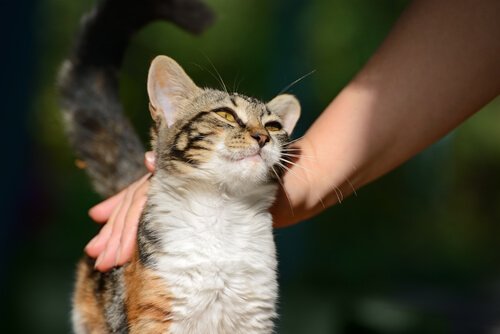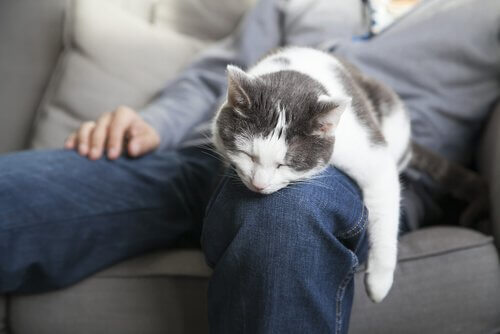Things that Happen When You Have a Cat

Some cat lovers claim that people who hate cats do so because they’ve never had one before. Others say that it’s not you who adopts the cat, but rather the cat who adopts you.
The truth is, these beautiful and enigmatic beings steal the hearts of those who open a place for them in their home. In other words, nothing remains the same anymore after you get a cat.
This and much more can happen when you have a cat
If you decide to have one of these adorable felines as a pet, you’ll surely be getting into a world full of new situations and sensations. You’ll soon find out that:

- Caressing sessions start and end when your cat feels like it.
- The cat considers you his/her property. Yes, it’s just as you read it. When your cat rubs his head against your legs, he’s actually leaving scent marks using the glands he has on each side of his face. These scent marks are imperceptible to you, but shows other cats that you are someone’s property.
- You deserve his entire trust. This happens when your cat lies on his back exposing his belly and lets you caress him.
- You become his family. The cat will show you this when he licks and grooms you as he would do with his kin. Licking your hands, your hair etc.
Nothing’s the same when a feline friend arrives at your home
Among the things that also happen when you have a cat (or two, or three) are the following:
- Unless you’re a hardcore night owl, your cat will surely wake up just as you’re getting ready to go to sleep. As a matter of fact, nighttime coincides with the time cats would go hunting if they were in the wild. That’s when they deploy most energy in games and races throughout the house.
- Drawers, closets and beds become the perfect hiding places for your meowing friend. They love to use them when taking a nice nap or to feel safe in unexpected situations. Not to mention the cardboard boxes that may have been left lying around. He’ll soon make them his property and have a lot of fun with them.
- Cats will use any piece of furniture to sharpen their nails if you can’t convince them that the best option for this practice is the scratching post you bought or built for them.
More things that happen when a cat is part of your life
You should also know that:
- The cat knows all your moves and actions perfectly. Both the ones he likes and the ones that bother him. If he hears the sound of his food plate being filled, he will immediately appear next to you. If he sees you grabbing his medicine or an antiparasitic, he’ll surely disappear from sight and you’ll find him hiding for safety under a bed or on top of a piece of furniture.
- Books, magazines, newspapers and even computers are now designed for your cat to lay on them (even if you’re using them).
- Virtually anything can become a toy or a hunting target.
And if that weren’t enough…
As you can see, there’s a long list of things to expect when a meowing friend decides to settle into your home and your life. Here are some more:
- Unless you wear gloves or long sleeves, you will most likely end up with a scratch on your hands or arms in the middle of playtime or a cuddling session.
- The “softest” places on your body are ideal for a good nap or for some cat kneading, a motion cats make by pushing in and out with their paws, alternating between right and left. Some say this is a kittenish behavior some cats keep in adulthood.
- Cat hairs are indisputably part of the home decor no matter how much cleaning you do. You’ll see them on the floor, on the sofa, on your clothes… (and perhaps you should take precautions if you suffer from allergies).

Having a cat is beneficial for your physical and mental health
Scientific studies have proven that having a pet can make us happier and healthier. If you have a cat you have probably experienced this on your own.
- Listening to a cat’s purring causes a calming effect and regulates blood pressure
- People who own cats have a lower risk of having a heart attack
- Cats can keep depression, stress and loneliness away
Some cat lovers claim that people who hate cats do so because they’ve never had one before. Others say that it’s not you who adopts the cat, but rather the cat who adopts you.
The truth is, these beautiful and enigmatic beings steal the hearts of those who open a place for them in their home. In other words, nothing remains the same anymore after you get a cat.
This and much more can happen when you have a cat
If you decide to have one of these adorable felines as a pet, you’ll surely be getting into a world full of new situations and sensations. You’ll soon find out that:

- Caressing sessions start and end when your cat feels like it.
- The cat considers you his/her property. Yes, it’s just as you read it. When your cat rubs his head against your legs, he’s actually leaving scent marks using the glands he has on each side of his face. These scent marks are imperceptible to you, but shows other cats that you are someone’s property.
- You deserve his entire trust. This happens when your cat lies on his back exposing his belly and lets you caress him.
- You become his family. The cat will show you this when he licks and grooms you as he would do with his kin. Licking your hands, your hair etc.
Nothing’s the same when a feline friend arrives at your home
Among the things that also happen when you have a cat (or two, or three) are the following:
- Unless you’re a hardcore night owl, your cat will surely wake up just as you’re getting ready to go to sleep. As a matter of fact, nighttime coincides with the time cats would go hunting if they were in the wild. That’s when they deploy most energy in games and races throughout the house.
- Drawers, closets and beds become the perfect hiding places for your meowing friend. They love to use them when taking a nice nap or to feel safe in unexpected situations. Not to mention the cardboard boxes that may have been left lying around. He’ll soon make them his property and have a lot of fun with them.
- Cats will use any piece of furniture to sharpen their nails if you can’t convince them that the best option for this practice is the scratching post you bought or built for them.
More things that happen when a cat is part of your life
You should also know that:
- The cat knows all your moves and actions perfectly. Both the ones he likes and the ones that bother him. If he hears the sound of his food plate being filled, he will immediately appear next to you. If he sees you grabbing his medicine or an antiparasitic, he’ll surely disappear from sight and you’ll find him hiding for safety under a bed or on top of a piece of furniture.
- Books, magazines, newspapers and even computers are now designed for your cat to lay on them (even if you’re using them).
- Virtually anything can become a toy or a hunting target.
And if that weren’t enough…
As you can see, there’s a long list of things to expect when a meowing friend decides to settle into your home and your life. Here are some more:
- Unless you wear gloves or long sleeves, you will most likely end up with a scratch on your hands or arms in the middle of playtime or a cuddling session.
- The “softest” places on your body are ideal for a good nap or for some cat kneading, a motion cats make by pushing in and out with their paws, alternating between right and left. Some say this is a kittenish behavior some cats keep in adulthood.
- Cat hairs are indisputably part of the home decor no matter how much cleaning you do. You’ll see them on the floor, on the sofa, on your clothes… (and perhaps you should take precautions if you suffer from allergies).

Having a cat is beneficial for your physical and mental health
Scientific studies have proven that having a pet can make us happier and healthier. If you have a cat you have probably experienced this on your own.
- Listening to a cat’s purring causes a calming effect and regulates blood pressure
- People who own cats have a lower risk of having a heart attack
- Cats can keep depression, stress and loneliness away
All cited sources were thoroughly reviewed by our team to ensure their quality, reliability, currency, and validity. The bibliography of this article was considered reliable and of academic or scientific accuracy.
von Muggenthaler, E. (2013). The felid purr: A healing mechanism? The Journal of the Acoustical Society of America. https://doi.org/10.1121/1.4777098
This text is provided for informational purposes only and does not replace consultation with a professional. If in doubt, consult your specialist.








